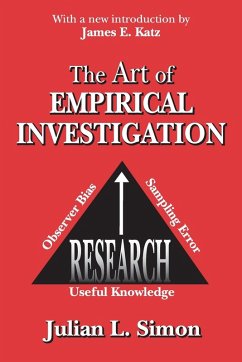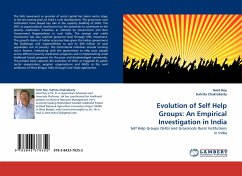The Art of Empirical Investigation
Herausgeber: Simon, Julian
The Art of Empirical Investigation
Herausgeber: Simon, Julian
- Broschiertes Buch
- Merkliste
- Auf die Merkliste
- Bewerten Bewerten
- Teilen
- Produkt teilen
- Produkterinnerung
- Produkterinnerung
Julian Simon was known for his methodical, and often controversial, writings challenging conventional beliefs about overpopulation, pollution, disappearing farmland, and the scarcity of energy sources and raw materials
Andere Kunden interessierten sich auch für
![Evolution of Self Help Groups: An Empirical Investigation in India Evolution of Self Help Groups: An Empirical Investigation in India]() Amit RoyEvolution of Self Help Groups: An Empirical Investigation in India32,99 €
Amit RoyEvolution of Self Help Groups: An Empirical Investigation in India32,99 €![Corruption and Bribery in Nigerian Economy: An Empirical Investigation Corruption and Bribery in Nigerian Economy: An Empirical Investigation]() Godwin NwaobiCorruption and Bribery in Nigerian Economy: An Empirical Investigation36,99 €
Godwin NwaobiCorruption and Bribery in Nigerian Economy: An Empirical Investigation36,99 €![Proposing Empirical Research Proposing Empirical Research]() Mildred L. PattenProposing Empirical Research248,99 €
Mildred L. PattenProposing Empirical Research248,99 €![Empirical Political Analysis Empirical Political Analysis]() Richard C. RichEmpirical Political Analysis216,99 €
Richard C. RichEmpirical Political Analysis216,99 €![An Empirical Study of the Social Correlates of Job Satisfaction among Plant Science Graduates of a Mid-Western University An Empirical Study of the Social Correlates of Job Satisfaction among Plant Science Graduates of a Mid-Western University]() Kebba DarboeAn Empirical Study of the Social Correlates of Job Satisfaction among Plant Science Graduates of a Mid-Western University76,99 €
Kebba DarboeAn Empirical Study of the Social Correlates of Job Satisfaction among Plant Science Graduates of a Mid-Western University76,99 €![Practical Social Investigation Practical Social Investigation]() Richard LampardPractical Social Investigation248,99 €
Richard LampardPractical Social Investigation248,99 €![New Directions in Empirical Translation Process Research New Directions in Empirical Translation Process Research]() New Directions in Empirical Translation Process Research90,99 €
New Directions in Empirical Translation Process Research90,99 €-
-
-
Julian Simon was known for his methodical, and often controversial, writings challenging conventional beliefs about overpopulation, pollution, disappearing farmland, and the scarcity of energy sources and raw materials
Hinweis: Dieser Artikel kann nur an eine deutsche Lieferadresse ausgeliefert werden.
Hinweis: Dieser Artikel kann nur an eine deutsche Lieferadresse ausgeliefert werden.
Produktdetails
- Produktdetails
- Verlag: Routledge
- Seitenzahl: 586
- Erscheinungstermin: 30. September 2003
- Englisch
- Abmessung: 229mm x 152mm x 31mm
- Gewicht: 837g
- ISBN-13: 9780765805300
- ISBN-10: 0765805308
- Artikelnr.: 21753576
- Herstellerkennzeichnung
- Libri GmbH
- Europaallee 1
- 36244 Bad Hersfeld
- gpsr@libri.de
- Verlag: Routledge
- Seitenzahl: 586
- Erscheinungstermin: 30. September 2003
- Englisch
- Abmessung: 229mm x 152mm x 31mm
- Gewicht: 837g
- ISBN-13: 9780765805300
- ISBN-10: 0765805308
- Artikelnr.: 21753576
- Herstellerkennzeichnung
- Libri GmbH
- Europaallee 1
- 36244 Bad Hersfeld
- gpsr@libri.de
Julian Simon
Basic Research Methods in Social Science
1: Introduction
I: Part One the Process of Social-Science Research
2: The Language of Research: Definitions and Validitg
3: Basic Concepts of Research
4: Types of Empirical Research
5: Theory, Model, Hypothesis, and Empirical Research
6: Choosing Appropriate Proxies for Theoretical Variables
II: Part Two Research Decisions and Procedures
7: The Steps in an Empirical Research Study
8: How to Assess the Potential Value of Research Projects
9: Sampling
10: Experiments: Pro, Con, and how to do them
11: Designing Experiments
12: Non-Experimental Designs Far Studying Relationships
13: Surveys: Pro, Can, and how to do them
14: Same Other Qualitative and Quantitative Techniques
15: Classifying, Measuring, and Scaling
16: Scaling Human Responses
17: Data Handling, Adjusting, and Summarizing
III: Part Three the Obstacles to Social-Science Knowledge and Wags to Overcome them
18: The Concept of Obstacles in the Search for Ernpical Knowledge
19: Obstacles Created by the Humanness of the Observer: Appendix on Interviewing
20: Complexities and Intractability of the Human Mind: Appendix an Questionnaire Construction
21: Obstacles to Obtaining Adequate Subject Matter
22: Obstacles to The Study of Changes Aver Time
23: Obstacles to the Search for Causal Relationships
24: The Master Obstacle: Cost
IV: Part Four Extracting the Meaning of Data
25: Analysis of Simple Data: Association and Regression
26: Searching for Relationships: Analysis of Complex Data
27: Inferential Statistics: Introduction
28: Probability and Hypothesis Testing by the Monte Carlo Method
29: Hypothesis Testing with Measured Data
30: Correlation and other Statistical Issues
31: How Big a Sample?
32: The Concept of Causality in Social Science, with Notes on Prediction, Law, Explanation, and Function
V: Part Five Epilogue
33: The Nature, Powers, and Limits of Social Science
1: Introduction
I: Part One the Process of Social-Science Research
2: The Language of Research: Definitions and Validitg
3: Basic Concepts of Research
4: Types of Empirical Research
5: Theory, Model, Hypothesis, and Empirical Research
6: Choosing Appropriate Proxies for Theoretical Variables
II: Part Two Research Decisions and Procedures
7: The Steps in an Empirical Research Study
8: How to Assess the Potential Value of Research Projects
9: Sampling
10: Experiments: Pro, Con, and how to do them
11: Designing Experiments
12: Non-Experimental Designs Far Studying Relationships
13: Surveys: Pro, Can, and how to do them
14: Same Other Qualitative and Quantitative Techniques
15: Classifying, Measuring, and Scaling
16: Scaling Human Responses
17: Data Handling, Adjusting, and Summarizing
III: Part Three the Obstacles to Social-Science Knowledge and Wags to Overcome them
18: The Concept of Obstacles in the Search for Ernpical Knowledge
19: Obstacles Created by the Humanness of the Observer: Appendix on Interviewing
20: Complexities and Intractability of the Human Mind: Appendix an Questionnaire Construction
21: Obstacles to Obtaining Adequate Subject Matter
22: Obstacles to The Study of Changes Aver Time
23: Obstacles to the Search for Causal Relationships
24: The Master Obstacle: Cost
IV: Part Four Extracting the Meaning of Data
25: Analysis of Simple Data: Association and Regression
26: Searching for Relationships: Analysis of Complex Data
27: Inferential Statistics: Introduction
28: Probability and Hypothesis Testing by the Monte Carlo Method
29: Hypothesis Testing with Measured Data
30: Correlation and other Statistical Issues
31: How Big a Sample?
32: The Concept of Causality in Social Science, with Notes on Prediction, Law, Explanation, and Function
V: Part Five Epilogue
33: The Nature, Powers, and Limits of Social Science
Basic Research Methods in Social Science
1: Introduction
I: Part One the Process of Social-Science Research
2: The Language of Research: Definitions and Validitg
3: Basic Concepts of Research
4: Types of Empirical Research
5: Theory, Model, Hypothesis, and Empirical Research
6: Choosing Appropriate Proxies for Theoretical Variables
II: Part Two Research Decisions and Procedures
7: The Steps in an Empirical Research Study
8: How to Assess the Potential Value of Research Projects
9: Sampling
10: Experiments: Pro, Con, and how to do them
11: Designing Experiments
12: Non-Experimental Designs Far Studying Relationships
13: Surveys: Pro, Can, and how to do them
14: Same Other Qualitative and Quantitative Techniques
15: Classifying, Measuring, and Scaling
16: Scaling Human Responses
17: Data Handling, Adjusting, and Summarizing
III: Part Three the Obstacles to Social-Science Knowledge and Wags to Overcome them
18: The Concept of Obstacles in the Search for Ernpical Knowledge
19: Obstacles Created by the Humanness of the Observer: Appendix on Interviewing
20: Complexities and Intractability of the Human Mind: Appendix an Questionnaire Construction
21: Obstacles to Obtaining Adequate Subject Matter
22: Obstacles to The Study of Changes Aver Time
23: Obstacles to the Search for Causal Relationships
24: The Master Obstacle: Cost
IV: Part Four Extracting the Meaning of Data
25: Analysis of Simple Data: Association and Regression
26: Searching for Relationships: Analysis of Complex Data
27: Inferential Statistics: Introduction
28: Probability and Hypothesis Testing by the Monte Carlo Method
29: Hypothesis Testing with Measured Data
30: Correlation and other Statistical Issues
31: How Big a Sample?
32: The Concept of Causality in Social Science, with Notes on Prediction, Law, Explanation, and Function
V: Part Five Epilogue
33: The Nature, Powers, and Limits of Social Science
1: Introduction
I: Part One the Process of Social-Science Research
2: The Language of Research: Definitions and Validitg
3: Basic Concepts of Research
4: Types of Empirical Research
5: Theory, Model, Hypothesis, and Empirical Research
6: Choosing Appropriate Proxies for Theoretical Variables
II: Part Two Research Decisions and Procedures
7: The Steps in an Empirical Research Study
8: How to Assess the Potential Value of Research Projects
9: Sampling
10: Experiments: Pro, Con, and how to do them
11: Designing Experiments
12: Non-Experimental Designs Far Studying Relationships
13: Surveys: Pro, Can, and how to do them
14: Same Other Qualitative and Quantitative Techniques
15: Classifying, Measuring, and Scaling
16: Scaling Human Responses
17: Data Handling, Adjusting, and Summarizing
III: Part Three the Obstacles to Social-Science Knowledge and Wags to Overcome them
18: The Concept of Obstacles in the Search for Ernpical Knowledge
19: Obstacles Created by the Humanness of the Observer: Appendix on Interviewing
20: Complexities and Intractability of the Human Mind: Appendix an Questionnaire Construction
21: Obstacles to Obtaining Adequate Subject Matter
22: Obstacles to The Study of Changes Aver Time
23: Obstacles to the Search for Causal Relationships
24: The Master Obstacle: Cost
IV: Part Four Extracting the Meaning of Data
25: Analysis of Simple Data: Association and Regression
26: Searching for Relationships: Analysis of Complex Data
27: Inferential Statistics: Introduction
28: Probability and Hypothesis Testing by the Monte Carlo Method
29: Hypothesis Testing with Measured Data
30: Correlation and other Statistical Issues
31: How Big a Sample?
32: The Concept of Causality in Social Science, with Notes on Prediction, Law, Explanation, and Function
V: Part Five Epilogue
33: The Nature, Powers, and Limits of Social Science








